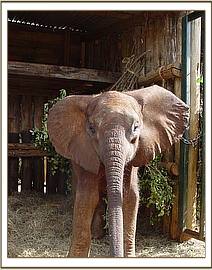A phone call from Mark Jenkins, Warden of Meru National Park, on the 25th April 2005 alerted us to the fact that he had spotted a young elephant, all alone and far from any other herds, who was obviously an orphan, and too young to survive without milk
A phone call from Mark Jenkins, Warden of Meru National Park, on the 25th April 2005 alerted us to the fact that he had spotted a young elephant, all alone and far from any other herds, who was obviously an orphan, and too young to survive without milk. Whilst we prepared all the gear, yet again, for the second rescue within a week (little Kora being the first), the Meru Park Rangers set forth to capture the calf, who turned out to be a bull just short of two years old, with tusks just visible through the lip but still very strong, although terrbly thin, prominent cheek bones indicating a starvation case who had been without his mother’s milk probably for over two weeks. (No calf younger than 2 can survive without milk, even though they may be eating vegetation, and those orphaned between the ages of 2 and 5 seldom make it without nutritional supplementation in the form of coconut, which contains the right sort of fat a young elephant needs for survival).
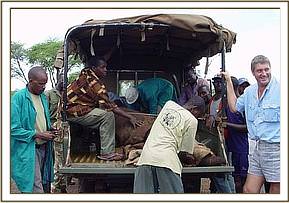

The place where he was found within Meru National Park is known as “Rapsu”, and this word in the Orma language means “a place with a lot of rocks”. It is an area normally popular with the Meru elephants during the wet season of April/May, each year, but on this occasion, the orphan now named “Rapsu” (to identify his origin) was the only one in the area, indicating that some terrible incident must have taken place, depriving him of his mother and driving the elephant herds away. (Apparently, a woman had been killed by an elephant outside the Park round about the time this elephant became an orphan but an elephant body has yet to be found. He could have been orphaned as a result of a stampede caused by community retribution. Illegal firearms are very common within the community, so there may be wounded elephants as a result).
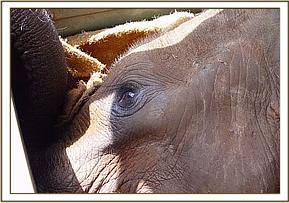

Capturing this calf was a challenge, and even more of a challenge was transporting him un-sedated in the Caravan Aircraft that flew up for the rescue. However, the Trust’s Rescue team is now very experienced, and once his legs were bound together and he was loaded onto the rescue tarpaulin and heaved into the plane by about 10 men, there was little resistance he could make. Meanwhile, some adjustments had to be made back home. Shida, the baby rhino, had to be up-graded to Magnum’s ex-Stockade; Galana moved into Shida’s night quarters, and her Stockade prepared for this large latest arrival.
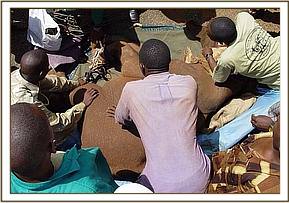
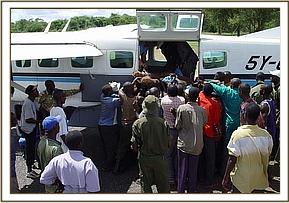

Upon arrival, at 5 p.m.. he was given the prophylactic antibiotic injection before being untied, when, in order to avoid being crushed, everyone had to make a hurried exit as he got to his feet. Desperately thirsty, he took water from a bucket placed outside the Stockade, but the sight of a human, even one holding a bottle of milk, provoked an angry reaction. However, during the night he drank milk from a bucket, and by the next day would accept it from the bottle, having seen all the other Nursery inmates drink theirs in this way. Administering the second of the three antibiotic injections needed also proved quite a challenge. A blanket had to be thrown across his head, whilst some l0 men rushed in to restrain him in a corner so that the Vet could deal with him. It took him a week to settle down but now he is as docile as all the other orphans.
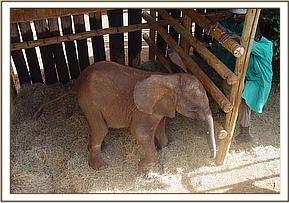
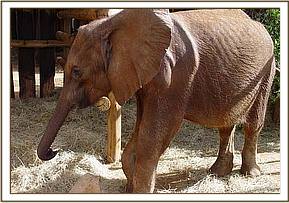

He is a good-looking little bull, with the longest eyelashes in the Nursery, and soft dark brown eyes. It became evident that he had a real problem with his left eye, and with the eye and inner eyelid tightly closed due to swelling it was impossible for any treatment to reach the intended place. As the days passed he seemed to have no sight in that eye. We resorted to sedating him in an effort to really have a close look at the problem. The operation revealed a large ulcer on the eye, and it was clear that this operation took place not a moment too soon as a perfurated ulcer results in instant loss of sight permanently. Under sedation we were able to get the ointment deep to the intended spot, and thankfully every day the eye has made a gradual improvement. We are confident that “Rapsu” will make a full recovery and be a great asset to the group, and be a good sparring partner for the other little boys both here, and up at Ithumba, where he will join Napasha, Taita and Tomboi when he is a little older.
